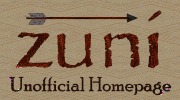
Grammar
Dictionary
Translator
For the search engines: Zuni, Native Americans, pueblo, cushing, kachina, kachinas, New Mexico, Corn Mountain
Zuni Language
-Grammar
Note: The Zuni language is very complicated with thousands of exceptions, but the following rules are the most common:
| Verbs | Present | Past | Future |
| ends w/ consonant | -'a, -e | -kya | -anna, -wa |
| ends w/ vowel | -'ya, -ye | -kya | -nna, -wa |
| Verbs | Present | Past | Future |
| "ido-" (to eat) | ido'ya | idokya | idonna |
| "ahh(a)-" (to take) | ahh'a | ahkya | ahhanna |
| Possessive | Singular | Dual | Plural |
| add suffix: | -a:ni | -a:chi | -a:wan |
| Plural | Nouns | Adj. | Verbs |
| add suffix/prefix: | -we | a- | a- or i- |
Important to Note:
~There are no words for 'he', 'she', 'they', or 'them' (see below)
~If a singular verb is spoken without a subject, it is assumed the subject is 'he' or 'she'
~If a plural verb is spoken without a subject, it is assumed the subject is 'they'
~To make words for people plural add the prefix 'a-' instead of adding the suffix '-we'
~There are no words for 'a', 'an', or 'the'
~Nouns that end with '-mme' and '-nne' often have this ending replaced with '-a:we' to become plural
~Nouns that end with '-le' often have this ending replaced with '-we' to become plural